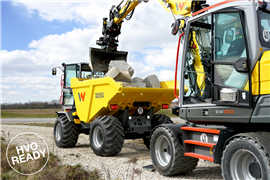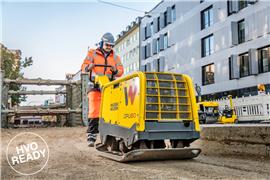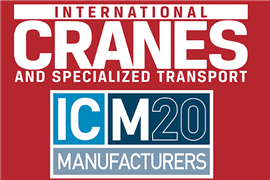Read this article in 中文 Français Deutsch Italiano Português Español
Going HVO: new Wacker Neuson compact machines accepting alternative fuel
19 September 2024
German-based construction and compaction equipment manufacturer Wacker Neuson said most of its product offerings can now use hydrotreated vegetable oils (HVO) to operate, which it said can reduce CO2 emissions up to 90%.
 A Wacker Neuson DV125 dumper and EW100 wheeled excavator. Newly built models (from September 2024 on) are “HVO ready” and can use either hydrotreated vegetable oils, diesel or a mix to power them. (Image: Wacker Neuson)
A Wacker Neuson DV125 dumper and EW100 wheeled excavator. Newly built models (from September 2024 on) are “HVO ready” and can use either hydrotreated vegetable oils, diesel or a mix to power them. (Image: Wacker Neuson)
The company said all its equipment and compact machines with a Stage 5 diesel engine produced from September and afterwards are approved to use HVO (in accordance with British Standard fuel specification EN 15940) in addition to diesel.
This includes excavators, wheeled dumpers, wheeled loaders and telehandlers, as well as vibratory plates, rammers, and rollers, Wacker Neuson said.
“The customer does not have to decide upon one fuel, but can operate the same engine with either pure HVO, an HVO-diesel mixture, or continue to use standard diesel,” explained Wacker Neuson.
The company said in tested use, it has not seen evidence using HVO on its machines impacts service life, maintenance intervals or emission behaviour.
“As there are no significant differences in the chemical properties between the fuels HVO and diesel, the engine does not necessitate any adaptations. There are also no additional requirements in terms of storage or use when compared with fossil fuels,” said Wacker Neuson, adding another benefit of HVO. “While diesel only has a shelf-life of approximately one year, HVO fuels have a shelf-life of several years,” said the OEM.
Also, as of September, all Wacker Neuson machines (with the exception of tracked dumpers) will be initially fuelled ex works with HVO.
Wacker Neuson’s zero-emission gameplan
 A Wacker Neuson DPU80 vibratory plate. (Image: Wacker Neuson)
A Wacker Neuson DPU80 vibratory plate. (Image: Wacker Neuson)
The ability to use HVO, Wacker Neuson said, is part of a holistic approach to zero-emission products.
“With the zero-emission series, including excavators, dumpers, wheel loaders and telehandlers, vibratory plates, rammers, and an internal vibrator system for concrete consolidation, it is possible to operate an entire construction site without any direct exhaust emissions,” the Wacker Neuson said.
The company added it plans to double its range of zero emission machines up to 40kW or 5 tons by 2025 and intends to offer battery-powered alternatives for all hand-held equipment by 2030.
STAY CONNECTED


Receive the information you need when you need it through our world-leading magazines, newsletters and daily briefings.
CONNECT WITH THE TEAM











